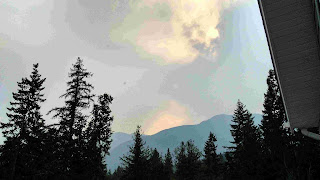With the fires that are raging in some parts of British Columbia this summer, our little valley has been relatively quiet, so far.
There are over 140 fires burning across the province, but only a small number here in the West Kootenays. The closest ones to us include the Harrop fire, which is south of Kootenay Lake's West Arm and one called, interestingly enough, the McCormick Creek fire, south of Salmo.
There is significant smoke in the air, though, and most days we can't see much of the other side of Kootenay Lake, about a mile distant. I can't imagine how bad the air quality must be in parts of the province where the fires are larger and much closer. This was the view looking west from our house late this afternoon. Clouds are starting to appear, and they say there is a chance of cooler weather and some showers.
Air quality is noticeably bad and with the heat, which has been at or over +30C every day for a few weeks now, and not cooling down much below +20C at night, there is little incentive to work outside. I usually spend the afternoons in the basement, working on other projects.
Some time ago, we put together an emergency plan of sorts and have some bags and boxes packed and stacked by the door. We realize that if something happens, it could happen quickly, and we need to be ready.
Over the past couple of days, we had our twin grandsons visiting. Being Kootenay Kids, they have heard about the possibility of evacuation, they've seen the smoke and they understand something of what that means. One of the boys told us that if we needed to evacuate we had to bring the LEGO boxes with us. He even carried them upstairs himself and put them with the other bags. So three boxes of LEGO are stacked by the door, just in case.
So we wait. And we watch. And we try to prepare for what might come.











